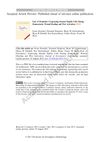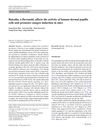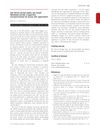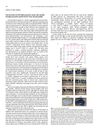 4 citations,
May 2018 in “Electronic Journal of Biotechnology”
4 citations,
May 2018 in “Electronic Journal of Biotechnology” All-trans retinoic acid at high doses harms goat hair growth cells and could be bad for hair growth.
 3 citations,
April 2022 in “International Journal of Molecular Sciences”
3 citations,
April 2022 in “International Journal of Molecular Sciences” Scientists turned mouse skin cells into hair-inducing cells using chemicals, which could help treat hair loss.
 2 citations,
May 2023 in “Marine Drugs”
2 citations,
May 2023 in “Marine Drugs” Marine-derived saccharides may help reduce aging effects on skin and hair by promoting cell growth and collagen production.
 2 citations,
January 2023 in “Scientific Reports”
2 citations,
January 2023 in “Scientific Reports” HIF-1α is important for hair growth and could be a treatment target for hair loss.
 2 citations,
April 2021 in “International Journal of Molecular Sciences”
2 citations,
April 2021 in “International Journal of Molecular Sciences” The study concluded that changing the culture conditions can cause sika deer skin cells to switch from a flat to a 3D pattern, which is important for creating hair follicles.
 August 2023 in “Scientific reports”
August 2023 in “Scientific reports” Human stem cells were turned into cells similar to those that help grow hair and showed potential for hair follicle formation.

Certain natural products may help stimulate hair growth by affecting stem cell activity in the scalp.
 June 2023 in “Antioxidants”
June 2023 in “Antioxidants” Lipids from Schizochytrium sp. help prevent hair loss by protecting hair cells from damage and promoting hair growth.
 May 2023 in “Stem cell research & therapy”
May 2023 in “Stem cell research & therapy” New method efficiently isolates hair growth cells from newborn mouse skin.
January 2020 in “한국공업화학회 연구논문 초록집” Encapsulated hair cells in a special gel can help regenerate hair follicles, potentially treating hair loss.
January 2010 in “International Journal of Dermatology and Venereology” Dermal papilla cells play a key role in hair loss by responding to androgens.
 February 2008 in “Journal of The American Academy of Dermatology”
February 2008 in “Journal of The American Academy of Dermatology” ROS may affect hair loss related to hormones.
 58 citations,
January 2006 in “Skin Pharmacology and Physiology”
58 citations,
January 2006 in “Skin Pharmacology and Physiology” High levels of testosterone and 5α-DHT can lead to cell death in cells important for hair growth.
 32 citations,
August 2015 in “Journal of Investigative Dermatology”
32 citations,
August 2015 in “Journal of Investigative Dermatology” Prominin-1 expressing cells in the dermal papilla help regulate hair follicle size and communication but don't aid in skin repair.
 March 2024 in “Journal of Microbiology and Biotechnology”
March 2024 in “Journal of Microbiology and Biotechnology” Phloroglucinol may help improve hair loss by promoting hair growth and reducing oxidative stress.
 93 citations,
February 2015 in “Journal of Investigative Dermatology”
93 citations,
February 2015 in “Journal of Investigative Dermatology” Oxidative stress affects hair loss in men with androgenetic alopecia.
 22 citations,
December 2014 in “Naunyn-Schmiedeberg's Archives of Pharmacology”
22 citations,
December 2014 in “Naunyn-Schmiedeberg's Archives of Pharmacology” Baicalin helps hair grow by boosting certain cell activities and speeding up hair cycle in mice.
21 citations,
November 2015 in “Phytomedicine” Glycyrrhizic acid may help reduce unwanted hair growth.
 14 citations,
November 2007 in “Journal of Dermatological Science”
14 citations,
November 2007 in “Journal of Dermatological Science” Vitamin C derivative may promote hair growth by activating specific genes.
 12 citations,
April 2014 in “Molecular Medicine Reports”
12 citations,
April 2014 in “Molecular Medicine Reports” Targeting specific miRNAs may help treat hair follicle issues caused by hydrogen peroxide.
 9 citations,
June 2020 in “BMC Molecular and Cell Biology”
9 citations,
June 2020 in “BMC Molecular and Cell Biology” Stress hormone CRF can cause hair loss by affecting hair growth cells and hormones.
 8 citations,
October 2018 in “Applied sciences”
8 citations,
October 2018 in “Applied sciences” Alginate spheres help maintain hair growth potential in human cells for hair loss treatment.
 5 citations,
November 2022 in “Journal of Ginseng Research/Journal of ginseng research”
5 citations,
November 2022 in “Journal of Ginseng Research/Journal of ginseng research” Ginsenoside Re from Panax ginseng may prevent hair loss by maintaining autophagy and Wnt signaling in hair cells.
 3 citations,
May 2017 in “British journal of dermatology/British journal of dermatology, Supplement”
3 citations,
May 2017 in “British journal of dermatology/British journal of dermatology, Supplement” Certain cells around hair follicles help improve skin regeneration for potential use in skin grafts.
 1 citations,
October 2021 in “Clinical, Cosmetic and Investigational Dermatology”
1 citations,
October 2021 in “Clinical, Cosmetic and Investigational Dermatology” Vitamin B3 may help prevent hair loss and promote hair growth by protecting scalp cells from stress and reducing hair growth-blocking proteins.
 August 1994 in “Journal of dermatological science”
August 1994 in “Journal of dermatological science” Different substances affect hair and skin cell growth in various ways, with some promoting and others inhibiting cell proliferation.
 3 citations,
November 2018 in “Journal of cellular physiology”
3 citations,
November 2018 in “Journal of cellular physiology” Serenoa repens and N-acetyl glucosamine/milk proteins complex may help with hair growth and prevent hair loss.
 August 2021 in “Journal of Investigative Dermatology”
August 2021 in “Journal of Investigative Dermatology” Stress causes hair loss by making the body produce cortisol, which stops hair cells from growing.
 23 citations,
September 2011 in “Journal of Dermatological Science”
23 citations,
September 2011 in “Journal of Dermatological Science” Red LED light helps mouse hair grow by increasing growth factors from skin cells.
14 citations,
June 2021 in “Journal of dermatological science” Argan press cake extract might help grow hair and protect hair cells from damage and inflammation.


























